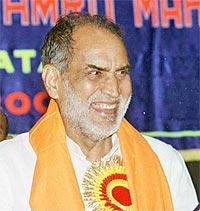
Nepal Democracy Solidarity Convention
Organized by the political parties and groups of India
24 February 2005
Constitution Club, Rafi Marg, New Delhi
Chandra Shekhar, Former Prime Minister: Any human who pretends to be a god, who wants to be a god will be destroyed completely. This king does not seem keen to learn and think. He wants to subdue the wishes of the tens of million of people for his personal ambition ..... If the king does not change immediately, more actions from India are necessary ..... I wish the king of Nepal had some brain.
Harkishan Singh Surjeet, General Secretary, CPI (M): The king has murdered people’s democracy in Nepal ...... We will not give any chance to this autocrat. Our government is solidly behind you.
Dipankar Bhattacharya, General Secretary, Communist Party of India (Marxist Leninist): .....the absolute king is back. This time, this monarchy needs to be abolished completely ..... If our government supports this regime in Nepal we will wage a struggle against our government from here ..... Nepal will certainly be a people democratic republic soon.
Romesh Bhandari - Central Working Committee Member, Indian National Congress: The king needs to learn that suppressing people is going to be dangerous for monarchy. I had told Birendra once, “look at what happened in Iran, how the king had to flee, learn from that" ..... People are like steam. If you suppress them they will burst. The more the king suppresses the people, the more dangerous it will be for him ..... The king should take back his step immediately. We warn him.
Dev Brat Bishwas, General Secretary, Forward Block: .....all of India is with Nepal, the people of Nepal, and for the movement for democracy. We give you complete support for your democracy movement ..... This king - how did he dare take this step? ..... We are the largest democracy in the world. We have to support democracy movements, especially in our neighboring country Nepal, with which we have special ties. We believe you will start a joint movement soon.
Prof. Bimal Prasad , Former Indian Ambassador to Nepal: We should not forget the Nepal issue after a few months ..... The Indian government had issued strong statement immediately after the king’s move. But statement by themselves mean little if not followed by concrete action ..... we don’t know how long the fight will go on for ..... I never trusted this king’s motives. This is a very cunning man (ye bahut dhurt aadmi hai). I know him since long. Maybe he’s compulsive.
Surendra Mohan, Senior Socialist Leader: The kings of Nepal have always been against democracy. After the coup of 1960, it took 30 years for democracy to be restored. But this time it won’t take that long. .... The political parties in Nepal, you need to go against monarchy now
Anand Sharma - Spokesperson and Member of Central Working Committee, Indian National Congress: You need to amend this constitution so that such type of incidents can never repeat in the future.
Vijay Pratap, Coordinator, Socialist Front: Now you have a clear choice to make - monarchy or democracy. The dark Feb 1 was a blessing in disguise..... I appeal to each political party in India to form a special Nepal cell..... The BJP needs to apologize to the nation, if you can’t get the Vishhow Hindu Parishad to retract its statement supporting the king’s coup...... What the king of Nepal did has nothing to do with Hinduism. ..... Differences will remain in terms of ideology. Such differences should indeed remain. But, you can still have a working unity. The Maoists should also realize this. ..... The Maoists support multi-party democracy only as a strategy, not as an objective. They need to compromise with the democratic political parties
A. B. Bardhan, General Secretary, Communist Party of India: The king has asked for three years. He wants three years to consolidate his autocracy. I tell you, this time, he will not have three years. See what happens within three months ..... The prime minister invited us in the evening of 1 February to discuss the situation in Nepal. I told him that evening that India should immediately stop military aid to this autocrat..... This king will not survive for long. .... The Nepali Maoists are Nepalis and the Indian Maoists are Indians. They are separate. India should not be paranoid about the Nepali Maoists...... We need to be conscious that this agenda should not die down after a few months.
Dilip Singh Bhuriya, President, Jan Bikash Congress: We are the largest democracy in the world. But in our neighbor democracy has been strangulated. Nepal is burning now.
Brija Bhusan Tiwari, Senior Leader, Samajwadi Party: My electoral constituency is near to the Nepal border. I have been meeting many Nepali friends. I was suspecting for long that this king would take such a step. He has always been against the people. He has been against the Nepali people of Indian origin ..... We need to put so much pressure on him that he is forced to retract his step.
Surendra Shastri, President, Jay Jawan Jay Kishan Party: He has always been against democracy.
Ramesh Dixit, Professor, Luckhnow University: This is rare occasion and issue in India in which, for the first time, political forces ranging from CPI(ML) to the Congress are together at the same stage. Interestingly, one former prime minister of India inaugurated this event, and another former prime minister is going to close it.
VP Singh, Former Prime Minister of India: For India, the important issue is not the king, but the nation..... we do away with autocracy and reinstate democracy without any mess, very cleanly. As they say, lets skim off the fat, without disturbing the milk.

